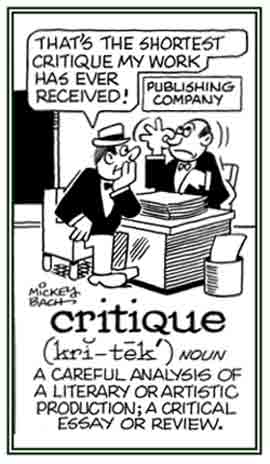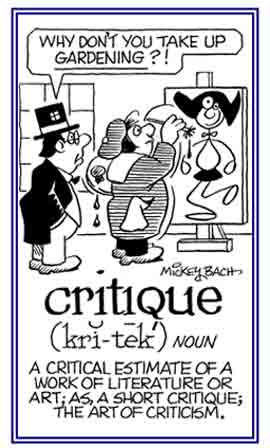cris-, crit-, cri-
(Greek: to separate; a separating, putting apart; a decision, decide; to judge)
critic
1. Someone who pronounces judgment on any thing or a person; especially,
anyone who passes a severe or unfavorable judgment; a censurer,
a fault-finder.
2. A person who is skillful in judging the qualities and merits of literary or artistic works or someone who writes about the qualities of such works.
3. A professional reviewer of books, pictures, plays, and the like; also a person who is skilled in textual or biblical criticism.
4. An essay in criticism of a literary work, etc.; a critical notice or review; now referred to as a critique.
2. A person who is skillful in judging the qualities and merits of literary or artistic works or someone who writes about the qualities of such works.
3. A professional reviewer of books, pictures, plays, and the like; also a person who is skilled in textual or biblical criticism.
4. An essay in criticism of a literary work, etc.; a critical notice or review; now referred to as a critique.
critical
1. Given to judging; especially given to adverse or unfavorable criticism; fault-finding, censorious.
2. Involving or exercising careful judgement or observation; nice, exact, accurate, precise, punctual.
3. Occupied with or skillful in criticism.
2. Involving or exercising careful judgement or observation; nice, exact, accurate, precise, punctual.
3. Occupied with or skillful in criticism.
criticaster
1. An incompetent or inferior critic.
2. A contemptible or vicious critic.
3. A petty or inferior critic.
2. A contemptible or vicious critic.
3. A petty or inferior critic.
criticise
British spelling of criticize.
criticism
1. The action of criticizing, or passing judgment upon the qualities or merits of anything; especially, the passing of unfavorable judgment; fault-finding, censure.
2. The art of estimating the qualities and character of literary or artistic work; the function or work of a critic.
3. The act of finding fault; censuring; disapproval.
2. The art of estimating the qualities and character of literary or artistic work; the function or work of a critic.
3. The act of finding fault; censuring; disapproval.
criticize (verb), criticizes; criticized; criticizing
1. To analyze and to judge something as a professional critic: Jim asked Mr. Stevens, his English teacher, to read through his essay and to evaluate and criticize it before it was to be printed in the school newspaper.
2. To judge disapprovingly or to find fault with something or someone: Joseph criticized the city for the existence of the excessive traffic in his neighborhood which was caused by the construction that was going on at the main street.
2. To judge disapprovingly or to find fault with something or someone: Joseph criticized the city for the existence of the excessive traffic in his neighborhood which was caused by the construction that was going on at the main street.
1. An expression that indicates a disapproving analysis or evaluation of a subject, a situation, a literary work, etc.: Shirley wrote a strong critique about the politician who was campaigning to be the mayor of her city.
2. The act of indicating the faults of someone or something in a disapproving way: Joe wrote a critique to the company about the defective workmanship of the man who was sent to repair the electrical equipment in his kitchen.
3. A careful judgment in which a person gives his or her opinion about the good and bad parts of something; such as, a piece of writing or a work of art: The newspaper reporter presented a fair and honest critique about Adam's new novel regarding the life of a refugee family from Africa who were living in California.

© ALL rights are reserved.

© ALL rights are reserved.

© ALL rights are reserved.
Go to this Word A Day Revisited Index
2. The act of indicating the faults of someone or something in a disapproving way: Joe wrote a critique to the company about the defective workmanship of the man who was sent to repair the electrical equipment in his kitchen.
3. A careful judgment in which a person gives his or her opinion about the good and bad parts of something; such as, a piece of writing or a work of art: The newspaper reporter presented a fair and honest critique about Adam's new novel regarding the life of a refugee family from Africa who were living in California.



Go to this Word A Day Revisited Index
so you can see more of Mickey Bach's cartoons.
diacritical
1. Serving to distinguish or able to distinguish; said of a mark or symbol to show pronunciation.
2. Indicating a change or modification in something; especially, in the way a printed letter is to be pronounced or stressed.
3. Capable of distinguishing, discerning, or showing a capacity for discerning.
2. Indicating a change or modification in something; especially, in the way a printed letter is to be pronounced or stressed.
3. Capable of distinguishing, discerning, or showing a capacity for discerning.
1. A loud, repetitive noise that is used to mislead people into thinking that there is a crisis, or a life-threatening situation, when there really is none: The false alarm at the school resulted in firefighters going there for nothing.
2. Something that causes people to wrongly believe that a bad or dangerous thing is going to happen: The report in the news which indicated that the company was going out of business was just another one of those false alarms.
2. Something that causes people to wrongly believe that a bad or dangerous thing is going to happen: The report in the news which indicated that the company was going out of business was just another one of those false alarms.
hepatic crisis
A severe pain in the liver.
hypercriticism
Excessive criticism; criticism that is unduly severe or about minute (trivial) matters.
hypercriticize
To criticize excessively or unduly.
hypertensive crisis
A sudden increase of blood pressure to a very high level associated with
vomiting, severe headache, transient blindness, and the rapid deterioration
of renal (kidney) function.
hysterical crisis
A hysterical (excessive or uncontrollable emotion) attack, fit, or
convulsion.
ocular crisis
The sudden onset of severe ocular pain and photophobia.


